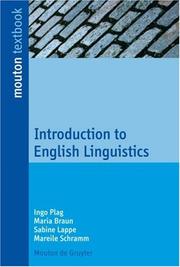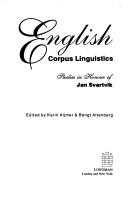| Listing 1 - 10 of 11 | << page >> |
Sort by
|
Book
ISBN: 9781403945907 140394590X Year: 2009 Publisher: Basingstoke: Palgrave MacMillan,
Abstract | Keywords | Export | Availability | Bookmark
 Loading...
Loading...Choose an application
- Reference Manager
- EndNote
- RefWorks (Direct export to RefWorks)
Langue anglaise --- --Linguistique anglaise --- --English language --- English language --- Varitation --- English language. --- Varitation. --- Linguistique anglaise --- English language - Varitation
Book
ISBN: 041509089X 9780415090896 Year: 1987 Publisher: London ; New York, NY : Routledge,
Abstract | Keywords | Export | Availability | Bookmark
 Loading...
Loading...Choose an application
- Reference Manager
- EndNote
- RefWorks (Direct export to RefWorks)
--Lexicology. --- Vocabulaire --- --Linguistique anglaise --- --Lexicologie --- --Langue anglaise --- Vocabulary --- Anglais (Langue) --- Study and teaching --- Lexicologie --- Etude et enseignement --- Lexicology. --- Linguistique anglaise --- Langue anglaise --- VOCABULARY --- ENGLISH LANGUAGE --- USAGE
Book
ISBN: 0030103916 9780030103919 Year: 1975 Publisher: New York (N.Y.): Holt, Rinehart and Winston
Abstract | Keywords | Export | Availability | Bookmark
 Loading...
Loading...Choose an application
- Reference Manager
- EndNote
- RefWorks (Direct export to RefWorks)
English language --- Langue anglaise --- --Linguistique anglaise --- --Grammaire générative --- --English language --- Language and languages --- Grammar, Generative --- -Language and languages --- Foreign languages --- Languages --- Anthropology --- Communication --- Ethnology --- Information theory --- Meaning (Psychology) --- Philology --- Linguistics --- Germanic languages --- Language and languages. --- Grammar, Generative. --- Generative grammar --- Linguistique anglaise --- Grammaire générative --- English language - Grammar, Generative

ISBN: 0521401798 9780521401791 Year: 1996 Publisher: Cambridge Cambridge University Press
Abstract | Keywords | Export | Availability | Bookmark
 Loading...
Loading...Choose an application
- Reference Manager
- EndNote
- RefWorks (Direct export to RefWorks)
English language --- Langue anglaise --- --Linguistique anglaise --- --English language --- Handbooks, manuals, etc. --- grammatica --- geschiedenis --- spelling --- Engels --- linguïstiek --- Anglais (Langue) --- Handbooks, manuals, etc --- Guides, manuels, etc --- Dictionaries --- 802.0 <03> --- Germanic languages --- 802.0 <03> Engels. Engelse taalkunde--Naslagwerken. Referentiewerken --- Engels. Engelse taalkunde--Naslagwerken. Referentiewerken --- #KVHA:Taalkunde. Encyclopedieen. Engels --- --Engels --- English language - Handbooks, manuals, etc --- Linguistique anglaise

ISBN: 3110198347 9783110198348 3110189690 9783110189698 9783110189698 Year: 2011 Publisher: Berlin Boston
Abstract | Keywords | Export | Availability | Bookmark
 Loading...
Loading...Choose an application
- Reference Manager
- EndNote
- RefWorks (Direct export to RefWorks)
The book introduces beginning university students of English to the study of English linguistics. The major difference between this book and its potential competitors lies in its hands-on didactic orientation, with a strong focus on linguistic analysis and argumentation. Language and linguistic theory are approached from a strictly empirical perspective: given a certain set of data to be accounted for, certain theoretical and methodological problems must be solved in order to analyze and understand the data properly. Thus, the theoretical apparatus is crucially developed in conversation with the data, and not presented as a set of given facts. After having worked with the book, the students should be able to use necessary methodological tools to obtain relevant data (such as corpora, dictionaries, experiments), and to systematically analyze their data and relate their findings to theoretical problems. The book is not written from the perspective of a particular theoretical framework and draws on insights from various research traditions. Introduction to English Linguistics concentrates on gaining expertise and analytical skills in the traditional core areas of linguistics, i.e. phonology, morphology, syntax, semantics and pragmatics. The final chapter on "Extensions and applications" widens the perspective to other areas of linguistic research, such as historical, socio- and psycholinguistics. Exercises and a glossary are also provided.
English language. --- Linguistics. --- English language --- Linguistic science --- Science of language --- Language and languages --- Germanic languages --- Grammar. --- Analysis and parsing --- Diagraming --- Composition and exercises --- Linguistique anglaise --- Linguistics --- English language - Grammar --- English/ language. --- linguistics. --- textbook.

ISBN: 0582248787 0582248779 9780582248779 9780582248786 Year: 1996 Publisher: London Longman
Abstract | Keywords | Export | Availability | Bookmark
 Loading...
Loading...Choose an application
- Reference Manager
- EndNote
- RefWorks (Direct export to RefWorks)
Philologie anglaise --- --Recherche --- --Linguistique anglaise --- --Corpus --- --Lexicologie --- --Linguistique computationnelle --- --Corpora (Linguistics) --- Computational linguistics --- Linguistic analysis (Linguistics) --- Applied linguistics --- 800 <082> --- Linguistics --- -Linguistic science --- Science of language --- Language and languages --- Analysis, Linguistic (Linguistics) --- Analysis (Philosophy) --- Grammar, Comparative and general --- Automatic language processing --- Language data processing --- Natural language processing (Linguistics) --- Cross-language information retrieval --- Mathematical linguistics --- Multilingual computing --- Taalwetenschap. Taalkunde. Linguistiek--Feestbundels. Festschriften --- Methodology --- Data processing --- Applied linguistics. --- Computational linguistics. --- Corpora (Linguistics) --- Computerlinguïstiek --- Corpus linguistics --- -Taalwetenschap. Taalkunde. Linguistiek--Feestbundels. Festschriften --- 800 <082> Taalwetenschap. Taalkunde. Linguistiek--Feestbundels. Festschriften --- Corpora (Linguistics). --- Linguistic analysis (Linguistics). --- Computerlinguïstiek. --- Corpus linguistics. --- -Analysis, Linguistic (Linguistics) --- Linguistic science --- Corpus-based analysis (Linguistics) --- Recherche --- Linguistique anglaise --- Corpus --- Lexicologie --- Linguistique computationnelle

ISBN: 0582059313 0582059305 9780582059306 Year: 1991 Publisher: London Longman
Abstract | Keywords | Export | Availability | Bookmark
 Loading...
Loading...Choose an application
- Reference Manager
- EndNote
- RefWorks (Direct export to RefWorks)
English language --- Computational linguistics --- Germanic languages --- Automatic language processing --- Language and languages --- Language data processing --- Linguistics --- Natural language processing (Linguistics) --- Applied linguistics --- Cross-language information retrieval --- Mathematical linguistics --- Multilingual computing --- Discourse analysis&delete& --- Data processing --- Research&delete& --- Langue anglaise --- --Informatique --- --Linguistique computationnelle --- --Linguistique anglaise --- --Corpus --- --Discours --- --Analyse --- --Recherche --- --English language --- Research --- Discourse analysis --- Computational linguistics. --- Data processing. --- Linguistique informatique --- Anglais (Langue) --- Analyse du discours --- Informatique --- Recherche --- Linguistique computationnelle --- Linguistique anglaise --- Corpus --- Discours --- Analyse --- English language - Research - Data processing --- English language - Discourse analysis - Data processing --- Corpus (linguistics)

ISBN: 9783110189698 3110189690 3110198347 Year: 2007 Publisher: Berlin Mouton de Gruyter
Abstract | Keywords | Export | Availability | Bookmark
 Loading...
Loading...Choose an application
- Reference Manager
- EndNote
- RefWorks (Direct export to RefWorks)
The book introduces beginning university students of English to the study of English linguistics. The major difference between this book and its potential competitors lies in its hands-on didactic orientation, with a strong focus on linguistic analysis and argumentation. Language and linguistic theory are approached from a strictly empirical perspective: given a certain set of data to be accounted for, certain theoretical and methodological problems must be solved in order to analyze and understand the data properly. Thus, the theoretical apparatus is crucially developed in conversation with the data, and not presented as a set of given facts. After having worked with the book, the students should be able to use necessary methodological tools to obtain relevant data (such as corpora, dictionaries, experiments), and to systematically analyze their data and relate their findings to theoretical problems. The book is not written from the perspective of a particular theoretical framework and draws on insights from various research traditions. Introduction to English Linguistics concentrates on gaining expertise and analytical skills in the traditional core areas of linguistics, i.e. phonology, morphology, syntax, semantics and pragmatics. The final chapter on "Extensions and applications" widens the perspective to other areas of linguistic research, such as historical, socio- and psycholinguistics. Exercises and a glossary are also provided.
English language --- Structural linguistics --- Anglais (Langue) --- Linguistique structurale --- Grammar --- Grammaire --- Linguistique anglaise --- --English language --- Linguistics --- 802.0 --- Engels. Engelse taalkunde --- English language. --- Linguistics . --- Grammar. --- 802.0 Engels. Engelse taalkunde --- Linguistic science --- Science of language --- Language and languages --- Germanic languages --- Analysis and parsing --- Diagraming --- Composition and exercises --- Linguistics. --- English/ language. --- linguistics. --- textbook.

ISBN: 9781405187879 9781405113823 1405187875 1405113820 1780341822 0470753005 9786610850921 1405164255 0470797592 1280850922 140517840X Year: 2006 Publisher: Oxford Blackwell
Abstract | Keywords | Export | Availability | Bookmark
 Loading...
Loading...Choose an application
- Reference Manager
- EndNote
- RefWorks (Direct export to RefWorks)
English language --- Linguistics --- Applied linguistics. --- Anglais (Langue) --- Linguistique --- Linguistique appliquée --- Handbooks, manuals, etc. --- Guides, manuels, etc --- Engelse taalkunde --- 801 --- 802.0 --- Algemene taalwetenschap. Filologie --- Engels. Engelse taalkunde --- Engelse taalkunde. --- 802.0 Engels. Engelse taalkunde --- Linguistique appliquée --- Linguistique anglaise --- Linguistic science --- Science of language --- Language and languages --- Germanic languages --- Grammar --- --English language --- 20th century --- Applied linguistics --- --Engelse taalkunde.
Book
ISBN: 9044114611 9789044114614 Year: 2003 Publisher: Leuven Garant
Abstract | Keywords | Export | Availability | Bookmark
 Loading...
Loading...Choose an application
- Reference Manager
- EndNote
- RefWorks (Direct export to RefWorks)
An A to Z of Common Errors is a handy and concise reference book enabling users to check tricky problems in the fields of grammar, vocabulary, pronunciation and spelling both quickly and easily.The explanations are phrased in simple, everyday language and are accompanied by clear examples, taken from newspapers and radio and TV broadcasts. An A to Z of Common Errors is a practical and easy to use guide which will be found most useful, not only by intermediate and advanced students of English, but indeed by all those whose professional activities require the use of English. (Bron: covertekst)
Linguistique anglaise --- enge 844.6 --- taalfouten --- Engels - taalgebruik, taalzuivering, taalbeheersing, correctie van verkeerd taalgebruik, informatie over synoniemen --- Engels: taalzuiverheid taalbeheersing --- 802.0-06 Engels: taalzuiverheid taalbeheersing --- Engelse taal ; taalgebruik --- 802.0-06 --- 802.0-06 Engels: taalzuiverheid; taalbeheersing --- Engels: taalzuiverheid; taalbeheersing --- Lexicology. Semantics --- taalgebruik --- English language --- Engels --- Engelse taal --- woordenboeken. --- Lexicologie. Semantiek --- Engelse taalkunde --- grammatica --- spelling --- uitspraak --- woordenschat --- spraakkunst (grammatica)
| Listing 1 - 10 of 11 | << page >> |
Sort by
|

 Search
Search Feedback
Feedback About UniCat
About UniCat  Help
Help News
News